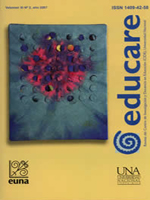Fundamentos del enfoque de competencias para la vida y de la transversalidad en el Ministerio de Educación Pública
DOI:
https://doi.org/10.15359/ree.11-2.3Keywords:
transversality, curriculum, human developmentAbstract
This article refers to the vision of the world of the people, knowledge, human development, the educational phenomena, curriculum, and the teaching-learning process from the M.E.P.’s transversality in Costa Rica. Starting with this base; it also presents the conceptualisation of the transversalty, it’s topics, cross curricular topics and competences for life; as basic elements for the development of this model in the costarican Educative System.
References
Atoréis, A. (2005). Habilidades para la vida en las evaluaciones de lectura y escritura. Buenos Aires.
Castellanos, B. y Moyano, M. (2001). La educación de la sexualidad en países de América Latina y el Caribe. UNFPA.
Celorio, G. (1996). Desde una transversalidad de trámite a una transversalidad renovadora. Aula de Innovación Educativa 1.
Delors, J. (1996). La educación encierra un tesoro. Infonne a UNESCO de la Comisión
Internacional sobre la Educación para el Siglo XXI. Quito: UNESCO.
Foro Mundial sobre la Educación. (2000). Educación para todos. DAKAR.
Gallo, S. (s.f.). Conocimiento y transversalidad. Brasil: CAMPINAS.
González, O. y Flores, M. (1998). El trabajo docente. México: TRILLAS.
Marco de Acción Regional. (2000). Educación para todos en las Américas. Santo Domingo.
Magendzo, A. (2002). Los temas transversales en el trabajo de aula. San José, Costa Rica.
Meléndez, L. (2005). Diversidad y equidad. Comisión Nacional de Rescate de Valores.
Ministerio de Educación Nacional de Colombia. (2003). Estándares básicos de competencias ciudadanas. Bogotá: IPSA.
Ministerio de Educación Pública. (2004a). Módulo de auto y mutua capacitación para la educación en valores. San José, Costa Rica.
Ministerio de Educación Pública. (2004b ). Transversalidad en el Sistema Educativo Costarricense. San José, Costa Rica.
I Jornada de Transversalidad. (1995). Conclusiones de los Seminarios de Transversalidad. Recuperado el 1 O de abril de 2002, de http://www.cip.fuhem.es/EDUCA/docs/ijornada.doc.
Rodríguez, J. L. (1999). Autonomía curricular. Madrid: Consejo Escolar del Estado.
Published
How to Cite
Issue
Section
License
1. In case the submitted paper is accepted for publication, the author(s) FREELY, COSTLESS, EXCLUSIVELY AND FOR AN INDEFINITE TERM transfer copyrights and patrimonial rights to Universidad Nacional (UNA, Costa Rica). For more details check the Originality Statement and Copyright Transfer Agreement
2. REUTILIZATION RIGHTS: UNA authorizes authors to use, for any purpose (among them selfarchiving or autoarchiving) and to publish in the Internet in any electronic site, the paper´'s final version, both approved and published (post print), as long as it is done with a non commercial purpose, does not generate derivates without previous consentment and recognizes both publisher's name and authorship.
3. The submission and possible publication of the paper in the Educare Electronic Journal is ruled by the Journal’s editorial policies, the institutional rules of Universidad Nacional and the laws of the Republic of Costa Rica. Additionally, any possible difference of opinion or future dispute shall be settled in accordance with the mechanisms of Alternative Dispute Resolution and the Costa Rican Jurisdiction.
4. In all cases, it is understood that the opinions issued are those of the authors and do not necessarily reflect the position and opinion of Educare, CIDE or Universidad Nacional, Costa Rica. It is also understood that, in the exercise of academic freedom, the authors have carried out a rogorous scientific-academic process of research, reflection and argumentation thar lays within the thematic scope of interest of the Journal.
5. The papers published by Educare Electronic Journal use a Creative Commons License:














 The articles published by Educare Electronic Journal can be shared with a Creative Commons License:
The articles published by Educare Electronic Journal can be shared with a Creative Commons License: 



